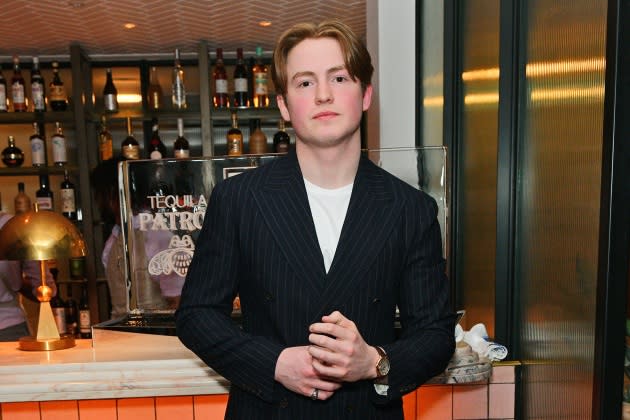We Failed ‘Heartstopper’ Star Kit Connor. Let’s Make Sure It Doesn’t Happen Again
- Oops!Something went wrong.Please try again later.
- Oops!Something went wrong.Please try again later.

When Netflix‘s heartwarming queer romance Heartstopper first premiered on the streaming app, the internet was a huge fan of the series’ emotional storyline and honest script. But it was Heartstopper‘s 18 and 17-year-old leads Kit Connor (Nick Nelson) and Joe Locke (Charlie Spring), who sold viewers everywhere in its emotional core — and pushed the boundaries of what a queer young adult series could look like. In a GQ cover story released earlier this week, Connor and Locke both said they were taken aback by the series’ success and felt an enormous pressure to be the faces of such an important show. All eyes are on them — something Connor said felt “like you’ve just got your license, and you’re suddenly asked to be a getaway driver. There are certain things that you’re asked and expected to do, but you feel so unbelievably unequipped.” Heartstopper was heralded by fans and writers alike for its positive representation and diverse cast, and its popularity has skyrocketed its cast into household recognition. But when Connor was cast in an upcoming romantic comedy — a straight one — that support fell out from underneath him, with hundreds of fans accusing the young actor of queerbaiting. The only problem? Connor is bi — and he said the backlash forced him to come out.
How did we get here?
More from Rolling Stone
Alex Anwandter Visualizes His Sexual Queer Fantasies on 'Maricoteca'
Netflix Turns Ryan Murphy's 'Monster' Limited Series Into Anthology With Two Additional Seasons
Orgasm 'Students' Sue Netflix to Block Release of OneTaste Documentary
If you’re on the internet, there’s a word you’ve probably seen a lot of lately: parasocial relationships. The internet has famously changed how people view celebrities. Instead of famous people being held in a high and untouchable place, we’ve brought them down from the mountain to the average person’s level. But now, social media allows so much access to celebrities that people begin to feel like they have a relationship and are owed something from people they only see on their screens. Connor famously avoids social media as much as possible. But that clearly didn’t stop him from seeing months of comments accusing him of queerbaiting. When news of the casting in Cuban Girl’s Guide to Tea and Tomorrow first broke, Connor said he was leaving Twitter for a bit, calling the app “silly.” But the energy continued, with some even calling for Connor to either come out or leave Heartstopper if he wasn’t gay. “Is he bisexual?” one user tweeted. “We’re tired of straight actors taking non straight roles. Just find a bi actor, not that hard.”
“Back for a minute,” Connor finally tweeted the last week of October. “I’m bi. congrats for forcing an 18 year old to out himself. i think some of you missed the point of the show. bye.”
It’s clear the current concern around queerbaiting comes from a place of wariness around popular media. The term gained commercial use surrounding television series and online fandoms in the early 2000s when shows and films often implied queer relationships to draw viewers in but never actualized them. Filmmaker Leo Herrera previously told Rolling Stone that queerbaiting is also when a “celebrity or a public figure capitalizes on the suspicion that they may be romantically involved with another same-sex person for the sake of publicity, promotion, or a capitalistic gain.” The idea with queerbaiting is to string fans on long enough with the hope they might be represented, only to leave them for mainstream ideals.
But Heartstopper has never made a promise it didn’t answer tenfold. The show was queer at its conception and has gone above and beyond to maintain the representation and important content that made the book series so popular. The show “was for us and the representation we never had,” Connor told GQ. So it’s doubly ironic that a show that encourages teens to figure out their sexualities on their own terms and literally has quotes like “Don’t feel like you have to come out yet before you are ready” would have its main cast member so publically and rudely questioned.
All of Connor’s cast members and friends rallied behind him after he came out, sending the young actor their love and support. But it’s getting easier to imagine a scenario where a young actor is forced to choose between their career and outing themselves before they feel ready. Which begs the question: is this the best we can do for the people who dare to tell our stories?
Best of Rolling Stone
